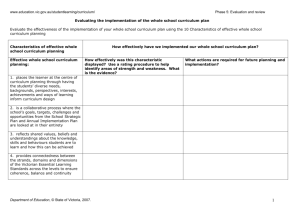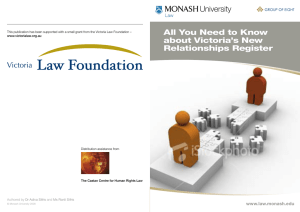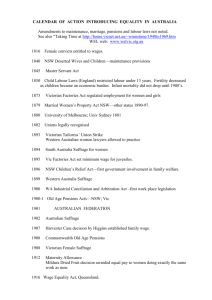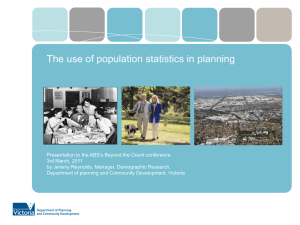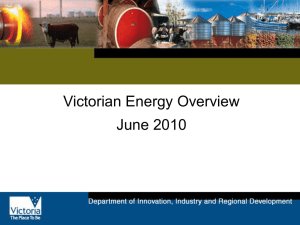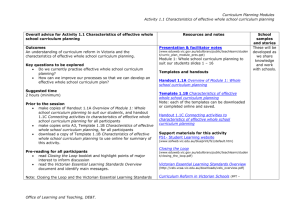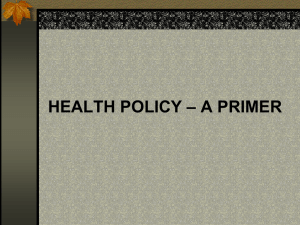Cath-Harmer-Encouraging-shared-decision-making-in
advertisement
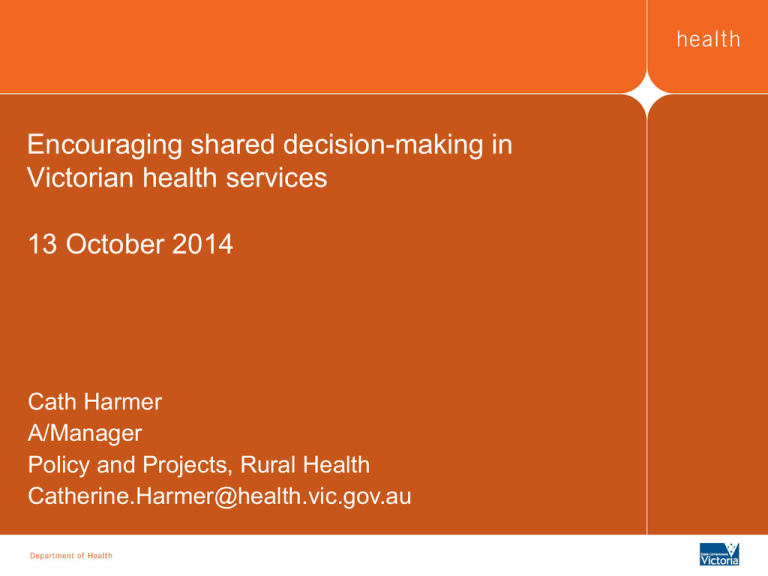
Encouraging shared decision-making in Victorian health services 13 October 2014 Cath Harmer A/Manager Policy and Projects, Rural Health Catherine.Harmer@health.vic.gov.au Shared Decision Making • Shared decision making (SDM) is a collaborative process that allows patients and their providers to make health care decisions together, taking into account the best scientific evidence available, as well as the patient’s values and preferences. (Informed Medical Decisions Foundation www.informedmedicaldecisions.org/what-is-shareddecision-making/ ) Ottawa Hospital Research Institute Two conceptual frameworks • Interprofessional SharedDecision-Making • Ottawa Decision Support Framework https://decisionaid.ohri.ca/models.html Victorian history – shared decision-making as definition of participation. “Participation occurs when consumers, carers and community members are meaningfully involved in decision making about health policy and planning, care and treatment, and the wellbeing of themselves and the community. It is about having your say, thinking about why you believe in your view, and listening to the views and ideas of others. In working together, decisions may include a range of perspectives.” (Doing it with us not for us, 2006, 2009, 2011 www.health.vic.gov.au/consumer ) Evaluating Effectiveness of Participation Projects • Eight evaluations over six years based on the principles of consumer participation, using evidence based information and building the evidence on how shared decision-making improves outcomes for: • Residents in aged care – stories mapped with families and residents and reduction in inappropriate use of psychometric medication for dementia • People living with a mental health illness accessing care in emergency departments • Community consultation to plan and guide service development • Staff training developed and led by consumers and carers and supported by health professionals on working with people with a dual diagnosis of alcohol/drugs and mental health illness Supporting shared decision-making Evaluating Effectiveness of Participation Projects were supported by: • Funding for project officer • Encouraging collaboration with tertiary research centres • Providing the expertise of the Cochrane Consumer and Communication Review Group – Centre for Health Communication and Participation at La Trobe University www.latrobe.edu.au/aipca/about/chcp • Final report being a draft submitted to a peer reviewed journal • Allowing project development time and implementation time over two year period. Supporting shared decision-making • Implementation of the National Safety and Quality Health Service Standards (Australian Commission on Safety and Quality in Health Care http://www.safetyandquality.gov.au/ourwork/accreditation-and-the-nsqhs-standards/ • Victoria’s online education NSQHS Standards resources for health service staff including module on Person and Family Centred Care forthcoming at www.health.vic.gov.au/accreditation Victoria’s new resources – Mental Health Act 2014 • The Mental Health Act 2014 places consumers and carers at the centre of mental health treatment and care. • The legislation embeds supported decision-making which promotes strong communication between practitioners, patients and their families and carers and includes mechanisms such as: • Advance statements to record their treatment preferences in case they become unwell and need compulsory mental health treatment; • A nominated person who can receive information about the patient so they can provide the patient with support; and • A second psychiatric opinion that will enable patients to better understand their illness and to empower them to participate in decision making about their treatment. • Supported decision making requires a fundamental shift in the way clinicians provide compulsory mental health treatment and engage with people with mental illness ( www.health.vic.gov.au/mentalhealth/mhact2014/index.htm ) Victoria’s new resources – Advanced Care Planning • Victorians accessing health services will have the opportunity to express their preferences for future treatment and care through advance care planning so that they can have confidence that the health services are providing the treatment and care that they want. • Successful advance care planning depends on services having an organisational commitment to delivering person-centred care through client-clinician collaboration. The four priority action areas outlined in the strategy are: • Establishing robust systems so that your organisation can have the conversation. • Ensuring you have an evidence-based and quality approach to have the conversation. • Increasing your workforce capability to have the conversation. • Enabling the person you are caring for to have the conversation www.health.vic.gov.au/acp/strategy.htm Victoria’s new resources – Integrating consumer participation and evidence based care • “Current consent processes do not appear to be ideal for many doctors. In particular, junior doctors are often not confident taking consent for surgical procedures and require more support to undertake this task. This might include written information for junior staff, observation by senior colleagues when undertaking the task and ward-based communication skills teaching on consent taking.” (UK two teaching hospitals) (Wood et al, Health expectations, 2014, Sept, Doctors' perspectives of informed consent for non-emergency surgical procedures: a qualitative interview study.) Victoria’s new resources – Integrating consumer participation and evidence based care • Victorian clinicians obtaining informed consent through shared decision-making considering evidence based treatment, risks and benefits with the person. • Department making available more than 300 patient information brochures on specialist medical services. • Plain language, evidence-based brochures will be accessible electronically and free of charge to all Victorian public health services. • ‘Lite’ versions of many of the brochures will also be available to all Victorians through www.betterhealth.vic.gov.au/ • A webinar of the metropolitan education and training workshop held in September 2014 is now available at www.health.vic.gov.au/consumer/health-literacy.htm Thank you
